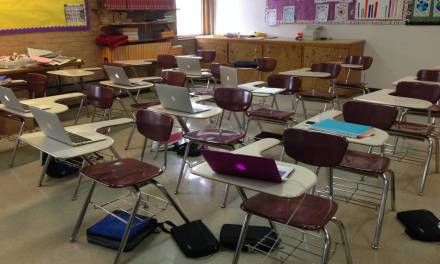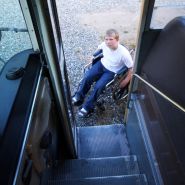“Separation anxiety is a normal developmental phenomenon” says Judith A Crowell, professor and interim division director of adolescent psychiatry at Stony Brook University.
But with the absence of school for some pupils of over six months, separation anxiety could be on the rise when schools return in September. “I think anything that is associated with uncertainty or change has the potential to trigger anxiety in kids,” says Crowell.
This blog post takes a look at separation anxiety disorder and why it could worsen in the new academic year.
What is separation anxiety?
In early childhood, crying, tantrums, or clinginess are healthy reactions to separation and a normal stage of development. Separation anxiety can begin before a child’s first birthday and many recur until the child is four years old. The intensity at which this occurs can vary a lot between child to child.
Even when your child is older, a little worry over a parent leaving is normal – however when this doesn’t go away this known as separation anxiety disorder.
Children with separation anxiety disorder experience a continuation or reoccurrence of intense separation anxiety during primary school years and further. It may be excessive enough to interfere with normal activities like school and friendships and lasts for months rather than days.
Why might separation anxiety be worse in September?
With school reopening on the horizon, many parents are debating how to get their child back into the world. As a routine of certain company has become the norm during lockdown, separation anxiety could be on the rise.
Crowell suggests taking steps to familiarise your child with old environments. This could include visiting schools in advance, talking to your children about who they would see at school and reminding them of formerly familiar routines. You could also spend additional time at the school drop-off point to go through tough parting emotions.
How can parents reduce anxiety at home?
Parents can reduce anxiety by taking small steps to facilitate the inevitable return to school life.
Having a routine, as much as possible, I think is helpful.
Schools have some little group, where they talk about what the day’s going to look like. Mimicking these small routines at home can help ease the transition into school.
There’s a lot of evidence, as much as you can, you should exercise. For everybody, being physical helps with anxiety.
Ultimately, you want to convey to them that they really are safe, that they really can do this.
How to ease “normal” separation anxiety
The following steps you can make to ease the separation process:
Practice separation: Leave your child with a caregiver for brief periods and short distances at first. As your child gets used to separation, you can gradually leave for longer and travel further.
Schedule separations after naps or feedings: Babies are more susceptible to separation anxiety when they’re tired or hungry.
Develop a quick “goodbye” ritual: Rituals are reassuring and can be as simple as a special wave through the window or goodbye kiss.
Leave without fanfare: Tell your child you are leaving and that you will return, then go – don’t stall or make it a big deal.
Follow through on promises: Your child needs to develop confidence that they can handle separation it is important that you return at the time promised.
Familiar surroundings: Have childsitters (etc) come to your house. When your child is away from home, encourage them to bring a familiar object.
Have a consistent caregiver: If you hire a caregiver, try to keep them on the job long term to avoid inconsistency in your child’s life.
Minimise scary television: Your child is less likely to be fearful if TV shows being watched are not frightening.
Try not to give in: Reassure your child that they will be just fine – setting consistent limits will help your child’s adjustment to separation.
For more mental health blogs click here.
What can schools do ease separation anxiety?
For children with separation anxiety, attending school can seem overwhelming and a refusal to go is commonplace. By addressing root causes for your child’s avoidance of school and by making changes at school you can help to reduce symptoms. These could include:
Help a child who has been absent from school return as quickly as possible: This may involve a shorter school day. Children’s symptoms are more likely to decrease when they discover they can survive the separation.
Ask the school to accommodate your child’s late arrival: If the school can be lenient about late arrival at first, it can give you and your child a little wiggle room to talk and separate at your child’s slower pace.
Identify a safe place: Find a place at school where your child can go to reduce anxiety during stressful periods. Develop guidelines for appropriate use of the safe place.
Allow your child contact with home: At times of stress at school, a brief phone call with family members may reduce separation anxiety.
Send notes for your child to read: You can place a note for your child in their lunchbox or locker. A quick “I love you” message can reassure a child.
Provide assistance to your child during interactions with peers: An adult’s help, whether it is from a teacher or counselor, may be beneficial for both you child and the other children that they’re interacting with.
Reward your child’s efforts: Any good effort or step in the right direction deserves praise.
How EDClass can help pupils with separation anxiety
EDClass has a range of different tools to help a multitude of learners, including those with separation anxiety.
Our platform provides students with:
- Access to Education
- Non-Pressurised Learning
- Online Tutor support via Text Chat
- Opportunities to build self esteem
A range of mental health support is also provided:
- Emotional Health
- Wellbeing Questionnaire
- Encouragement and Confidence
EDClass’ bank of 11,000+ lessons means you can undertake education online. Safeguarding is also ensured through alert mechanisms, enhanced DBS-checked staff, questionnaires for students using the system and eyes-on learning.
The system means students have access to high-quality education in their own home should they require it, with only an internet connection required. Teachers can log in to the system to monitor progress.
For more information click here, call 01909 568 338.









